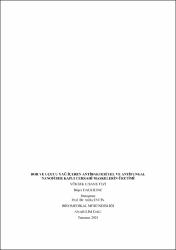Bor ve uçucu yağ içeren antibakteriyel ve antifungal nanofiber kaplı cerrahi maskelerin üretimi
Abstract
Bu çalışmada, selüloz asetat (CA) polimeri, önce borik asit ile daha sonra limon yağı, niaouli yağı, palmarosa yağı, patchouli yağı ile ayrı ayrı katkılandırılıp çözelti elde edilmiştir. Elde edilen çözeltiler elektroeğirme parametreleri göz önünde bulundurularak nanolif haline getirilip cerrahi maskenin melt blown tabakasına biriktirilmiştir. Oluşan nanolifler taramalı elektron mikroskobu(SEM) ile analiz edilip görüntü elde edilmiştir. Elde edilen SEM görüntülerinden Fibraquant programı yardımı ile lif yapısı, çapları, dağılımı, homojenliği belirlenmiştir. Çözeltilere uygulanan FTIR analizinde selüloz asetat, borik asit ve esansiyel yağlar için karakteristik pikler elde edilmiştir. Elde edilen çözeltilerin antibakteriyel etkileri, disk difüzyon yöntemi kullanılarak Staphylococcus aureus bakterisi üzerinde denenmiştir ve en yüksek antibakteriyel etkiye borik asit ve limon yağı katkılı selüloz asetat çözeltisinin sahip olduğu belirlenmiştir. Yine disk difüzyon yöntemi kullanılarak yapılan antifungal testinde ise Aspergillus flavus ve Penicillium notatum küflerinin büyümesine karşı borik asit ve palmarosa yağı katkılı selüloz asetat çözeltisinin etkili olduğu saptanmıştır. In this study, cellulose acetate (CA) polymer was first mixed with boric acid and then lemon oil, niaouli oil, palmarosa oil, and patchouli oil to form a solution. The solutions obtained were transformed into nanofibers considering the electrospinning parameters and deposited on the melt blown layer of the surgical mask. The resulting nanofibers were analyzed by scanning electron microscopy (SEM) and images were obtained. Fiber structure, diameters, distribution and homogeneity were determined from the obtained SEM images with the help of the Fibraquant program. Characteristic peaks were obtained for cellulose acetate, boric acid and essential oils in the FTIR analysis applied to the solutions. Antibacterial effects of the obtained solutions were tested on Staphylococcus aureus bacteria by using disk diffusion method and it was determined that cellulose acetate solution with boric acid and lemon oil added has the highest antibacterial effect. Again, in the antifungal test using the disk diffusion method, it was determined that cellulose acetate solution with boric acid and palmarosa oil was effective against the growth of Aspergillus flavus and Penicillium notatum molds.
Collections
- Yüksek Lisans Tezleri [890]



















